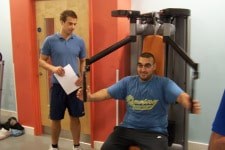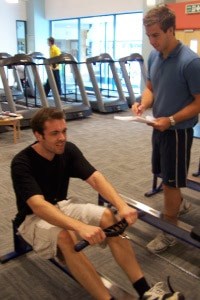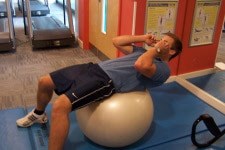Fitness instructors are employed to help people achieve and maintain good physical health, planning and implementing exercise routines and advising on diet, nutrition, exercise technique and other important areas.
Being a fitness instructor involves helping people to achieve goals and to become and stay fit, either in a gym environment or in a more informal location.
Work can either be on a freelance, self-employed basis (usually called personal training) or as a salaried employee in a gym, leisure centre or hotel department.
Common tasks would involve:
- Helping people to set and achieve their fitness targets
- Completing inductions to show people how to use equipment (if working in a gym)
- Supervising use of equipment and making sure that exercise is completed properly
- Running group classes
- Working individually with private clients
- Staying ahead of developments in health and exercise practice.
- Keeping fit
Salary
Salaries for fitness instructors largely depend on whether the individual is working on a contract or on a self-employed basis.
Salaries for contracted employees in a gym or leisure centre usually start around the £14k mark, depending on qualifications and experience, and increase as more experience and qualifications are achieved, up to £25k and above for more specialist or senior instructors.
As with most private tuition, a relatively high hourly wage can be achieved by fitness instructors running their own classes or individual tuition programmes.
Some people are prepared to pay as much as £50 per hour for these services but a more realistic figure is £15 – £25 per hour.
Responsibilities
Health and fitness is increasingly in the public eye and many people are becoming keen to take command of their own fitness.
Fitness instructors facilitate this process by providing expert advice on what to expect, how to exercise and monitor diet, and can also provide that crucial element of motivation which people may find difficult on their own.
Many modern jobs and lifestyles are too sedentary or hectic to include physical fitness and so helping people to include exercise in their life is a valuable service, delivering wellbeing that may reach beyond the purely physical.
By formalising exercise into a routine or programme, instructors allow people to set goals, such as lose weight or increase stamina, and chart progress before setting new goals.
Everyday tasks would ensure the smooth running of a fitness facility and taking care of duties such as inductions or supervision, or meeting clients to discuss needs or complete exercises.
Qualifications
Qualifications are an important aspect of being a fitness instructor, both for securing employment and ensuring safe practice.
Some instructors start by completing an A-level in Physical Education and Sports Studies and then a specific university degree (BSc) in sports studies, health and fitness management, sports science and other related subjects.
However, these are by no means necessary or sufficient.
Most employers will ask for a specific recognised qualification from a recognised governing body, as well as work experience (see below).
This can be achieved by completing a course before starting work or whilst doing training.
The largest governing body in the industry is the Register of Exercise Professionals (REP) and this body approves different qualifications, the most common of which is a certificate in Fitness Instructing.
This qualification is awarded by City & Guilds, Active IQ, VTCT, CYQ, OCR and NCFE and allows for specialisation in different areas of exercise, including group classes, gym work and water-based exercises.
Completing the Level 2 certificate is important because it allows registration to the Exercise Register, or REP.
Once on the register, instructors then need to get points to stay on by gaining credits in order to show commitment to continuing professional development (CPD).
Fitness instructors also need public liability insurance and a first aid certificate to show they can complete cardiopulmonary resuscitation (CPR).
For more information on the organisation, qualifications and continuing development, visit the following websites:
- Register of Exercise Professionals
- Active IQ
- OCR Information Bureau
- City & Guilds
- Central YMCA Qualifications (CYQ)
- NCFE
- Vocational Training Charitable Trust (VTCT)
As many employers ask for work experience and qualifications, work-based qualifications would be a good way to combine the two.
The best way to do this would be:
- To work as an assistant to a qualified instructor and complete an NVQ in Instructing Exercise and Fitness during this time (you can apply for level 2 entry on the REP).
- To secure an apprenticeship through the national apprenticeships scheme (see the website below for further details):
National Apprenticeships Scheme
More specialised areas of fitness training might require a lifeguard qualification (if working around water) or a CRB (Criminal Records Bureau) check (if working with minors).
For details of more advanced qualifications see the career progression section below.
Skills
Being a fitness instructor requires a range of skills including:
- Personal motivation to keep fit and the ability to motivate others to do the same
- Patience and the ability to explain things clearly
- Understanding of lifestyle, diet and the human body
- Awareness of safety and good working practices
Working Conditions
Fitness instructors spend the majority of their time in gyms or offices, which are comfortable environments.
However, keeping in shape is obviously hard work and an instructor’s own fitness must be maintained if they want to continue working and injury is therefore a possibility.
In addition, personal trainers may be asked to participate in running or sports with their clients, sometimes outdoors and in bad weather.
Experience
As mentioned previously, experience is important for securing a first job in fitness so gaining experience wherever possible is the best idea.
This could mean doing private work or trying to find employment in a fitness facility, in a hotel or spa, on a summer camp or in some closely related work such as sports coaching or lifeguarding.
Employers
In terms of national employers, local council authorities and large leisure centre chains are a good place to start.
Some of the largest gym chains are:
Career Progression

After completing entry-level qualifications and building experience there are a number of further qualifications which allow progression to Advanced Instructor Level.
- NVQ Level 3 in Instructing Physical Activity and Exercise (OCR, City & Guilds, CYP, Active IQ and VTCT).
- Level 3 Certificate in Advanced Fitness Instructing (CYP)
- Level 3 Certificate in Advanced Fitness Instructing (Gym), (OCR, City & Guilds, CYG, VTCT, NCFE)
- Level 3 Certificate in Personal Training, (CYP and Active IQ)
These qualifications allow entry to the Register of Exercise Professionals at level 3.
At this stage it is possible to begin focussing on working on more specific groups, including young and old people, pregnant women, disabled people and people sent by their doctors (GP referrals).
A further Level 4 qualification is now available, allowing instructors to focus on areas such as diabetes or back pain.
In general terms, more experience allows more specialisation and this can mean an instructor concentrating on anything from yoga to aerobics to weight-training, depending on what they enjoy or what is most profitable.
Image

Also known as…
- Trainer
- Personal Trainer
- Freelance Fitness Instructor
Related Jobs
What’s it really like?
Guy Moll, 24, is a fitness instructor working in Brighton.
How long have you been working as a fitness instructor?
Around two years, basically since I graduated from university in 2006.
I played a lot of sport at university (rugby and football) and spent a lot of time at the university gym.
Although I have been interested in fitness for a long time I only thought of taking it up as a profession after speaking to some of the instructors in the university gym.
I am now trying to build a personal training service but also doing some work experience with a view to completing formal qualification and getting on the Exercise Register.
What do you do in a typical day at work?
My day varies depending on bookings and although I try to organise regular slots for private clients (usually once or twice a week) quite a lot of flexibility is required.
In the mornings I work out a plan for the day and arrange any equipment or documentation needed for the day’s lessons.
I then go out and complete a session with a client – these are usually one hour but sometimes more.
If I have a day free I will exercise, do some casual research or work at the gym.
Sometimes a session will entail something as simple as a game of squash or a run but other times I go to clients’ houses with basic equipment (mats, weights, elastic cords) and complete exercise in their own home.
What do you like and dislike about the job?
I love staying fit and having that as part of my job is fantastic.
I also enjoy seeing other people get the fitness bug and change their lifestyle to become healthy.
Achieving goals with people is very rewarding.
The working environment is usually nice and I enjoy meeting people and helping them.
On the downside, the amount of qualifications required is a hindrance and makes it costly and time-consuming to become properly qualified.
Many employers want both one year’s experience and a REP-recognised qualification which is quite demanding, especially as it’s hard to get the experience without the qualification.
Any other advice?
Many people think personal training is a gold mine and that it’s easy to earn a high hourly wage but it is not as easy as it looks (because of the qualifications process) and income can be irregular and highly variable when you start out – be realistic and think about the long-term prospects.
Building a network of clients is crucial and personal recommendations are invaluable so it’s important to make the effort and impress every client every time if you want to build a business.
Also, if you can do some qualifications while at university then do so, as this will allow you to get ahead and there may also be the opportunity for subsidised training, which is a real help.









